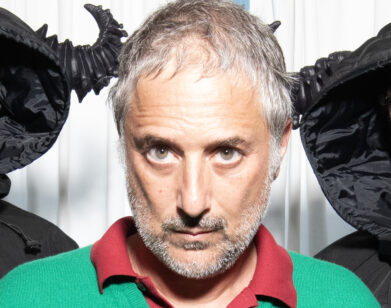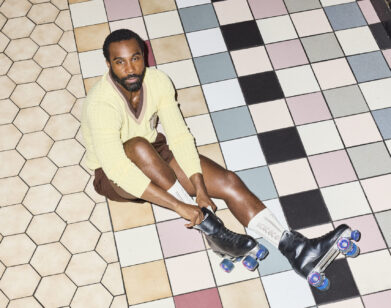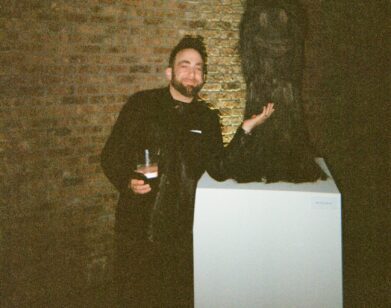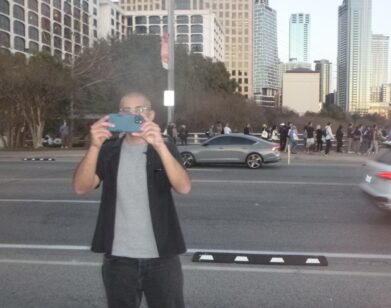Kenneth Anger In Conversation with Gaspar Noé
Kenneth Anger, the octogenarian American underground filmmaker, has largely been heralded as one of the founders of experimental film, with his role in inspiring directors such as Martin Scorsese and David Lynch. He pioneered outsider, cult and psychedelic film without ever imagining himself in a genre, and this year he crossed over into fashion and created a piece (with protegé and longtime collaborator Brian Butler) for the Italian fashion house Missoni.
Gaspar Noé, director of the recent film Enter the Void and creator of the controversial film Irreversible, has long been a vocal supporter of Kenneth Anger, telling Interview that Anger was the only person he wanted to see Enter the Void. Noé recently caught up with Anger by phone, while the former was in Paris and the latter in Boston. They discussed the essence of cinema, his experience with alien spacecrafts, and why you should not direct movies under the influence of LSD.—Kristina Benns
———
NOÉ: Do you remember we met a few years ago? You were in Paris doing a retrospective at the Cinémathèque…
ANGER: I remember, vaguely, but I do so many interviews, they seem to all blend together.
NOÉ: I think the reason why they asked me if I wanted to have a conversation with you is because in other interviews I have talked about you, about how when I think about the best psychedelic movies ever, one of the first things that comes to my mind is Inauguration of the Pleasure Dome.
Do you think you’d be a director today, if you hadn’t been in Max Reinhardt’s A Midsummer Night’s Dream (1935)?
ANGER: Well, It’s a long story. I began making movies at home, with a 16-millimeter camera that belonged to the family. Before that, I worked a little, I did a little part in A Midsummer Night’s Dream. Director Max Reinhardt was a friend of my grandmother’s, and that’s how that happened.
NOÉ: That movie reminds me of your movie Rabbit’s Moon (1950).
ANGER: I loved the artificial set of the forest at Warner Brothers, this huge set that they made in two connecting soundstages. So that influenced me. But also, I’m influenced by director Georges Méliès, and the simplicity of his magical painted steps, and so forth.
NOÉ: What are your favorite movies directed by other people?
ANGER: Well in the classic French tradition, I love Robert Bresson and I met Georges Franju, and I love his films. And Painlevé, and of course, Jean Cocteau. And I like some of the films of Marcel Carné very much. I love Arlette Langmann.
NOÉ: Do you often cry when you see movies?
ANGER: I don’t. I’m not a tear-shedder. But I feel it emotionally.
NOÉ: I have a heavy question… What is the essence of cinema for you? Is it reproducing the language of dreams, or creating a shamanistic trance?
ANGER: I think it’s basically quite different from dreams. If only cinema was that easy. Because dreams, all you have to do is fall asleep, and you can have fantastic vision. I know Baudelaire and people like that enhance their dreams with opium or something. But films are very constructed—they’re like architecture. They’re pieced together, glued together. To me, it’s a craft. It’s like making a tapestry. And I prefer to think of it—you know, um, the sweat is supposed to be invisible. But a lot of sweat can go into making a film. But of course, if you enjoy doing it, you enjoy doing it. I will go on cutting for three days without sleeping. You can have everything from a realistic story with recognizable people, or…
I actually love the Italian neo-realist films, and in some ways they seem very dreamlike. You know, the early Rossellini and so forth… But you can have a very expensive dream, which is quite beautifully done, which is like Cameron’s Avatar, which you probably saw. Did you see it?
NOÉ: Yes.
ANGER: Well, that can be considered like a dream, a very expensive dream. I prefer simpler things.
NOÉ: Do you think the language of dreams is universal? Do you think people in other countries have their own culturally specific way of dreaming? People in China, Africa…
ANGER: I think people dream in their own way, dreams are extremely personal, even from person to person. They are completely individual.
NOÉ: I don’t dream in 3-D, they aren’t very bright in color and there isn’t much dialogue. I don’t know about yours…
ANGER: Sometimes I dream in black and white. And actually, I love black and white films, even though it’s been a while since I made any myself. Do you work in color or black and white?
NOÉ: My last movie is extremely colorful. What is a dream you have had that was over-the-top, or really strange?
ANGER: When I was a teenager or a boy, I used to collect tin soldiers. And I had hundreds of them—I had a navy with a ship and the Marines. And I had a dream when I was about 15 of these soldiers coming alive and it was a fight with the Muslims, which is very sort of prophetic. So it was a fight against the Arabs—I remember the crescent on the flags. And the little toys came alive in my dream. They were still toys—they weren’t people. They were battling an invasion of the desert people under a crescent flag. It was the American flag against the crescent flag, which may be prophetic for something to come.
NOÉ: Have you ever killed people, or ever been killed in your dreams?
ANGER: Violence, you mean? No. No, I’ve never… have you?
NOÉ: Yes, sometimes. And when you wake up you’re in a very good mood. Because, you know, you wake up because you killed someone and you’re afraid of going to jail. And the moment you wake up you feel safe and it’s over and you can meet that person in the street and you’re not going to jail. The good thing about dreams is that they erase some kind of desire, because after your dreams you feel you’ve done it, and you’re relieved.
ANGER: Well they’re kind of escape valves. Perhaps one day there will be a way to put a little electronic device that sits on your head, and it will photograph a recording of your dream. I don’t think so, but it would be a good science fiction idea…
NOÉ: I collect all your books, all your articles, any poster I can find of your movies. Even funny articles you did, like that one on Close Encounters of the Third Kind. It said that you went six times to see it. There’s something in that movie—especially in the second edition—they go inside of the spaceship, and the question…
ANGER: See, the worst thing about that film—I’ve never talked to Spielberg about it, but the worst thing—because I have had several sightings of real flying saucers, and the amazing thing about them is that they are completely silent. There’s no motor sound, or humming sound, or anything. And the silence is absolutely awesome. Because you see this phenomenon, which is a little bit like the aurora borealis, or something, and it’s completely silent. And that’s much more thrilling than having motor sounds and humming and throbbing and stuff, which is very heavy-handed. At any rate, it was a movie that had a few moments.
NOÉ: In Inauguration of the Pleasure Dome, the priest or the shaman is giving a magic drink to all of the people around him, and I was surprised to read in some books about you, that he’s giving them yage. I’ve done yage many times in the jungle in Peru, and it’s a drink that is full of DMT. Have you ever done yourself chemical DMT? Or have you drunk ayahuasca?
ANGER: No, neither one. I’ve read about them, but I’ve never tried them. I don’t go out of my way to seek that sort of thing. But yage is from South America, isn’t it? I tried peyote, which makes me kind of ill before it clears up. But that takes all night.
NOÉ: Have you tried it many times?
ANGER: A few times. I haven’t taken any drugs, of any kind, in years. It was an experimental period in an earlier part of my life.
NOÉ: They open your mind, if you don’t lose your mind.
ANGER: Well, one thing you cannot do—once, I tried to film when I was on LSD. And I had very good LSD in the early days, because I was a friend in San Francisco of Owsley Stanley, the famous chemist. And in the early days, it was just a drop of it on a sugar cube. So I had very good LSD, but the problem was—I tried making a film, or doing some filming, when I was on LSD, and it’s impossible. I couldn’t focus. I tried focusing, but when I looked through the lens, I’d see all different layers of focus, and I couldn’t find which was the real one behind the camera. And I just thought, this does not work, and I never tried that again.
NOÉ: What happened with the other versions of the soundtrack for Inauguration of the Pleasure Dome? I heard some rock versions.
ANGER: I occasionally do an experimental track, like with Pink Floyd, I tried something with them. I destroyed the prints afterwards. I did some work with Jimmy Page, and then Mick Jagger did a short track for me, with a Moog synthesizer, for Invocation of My Demon Brother.
NOÉ: Can I ask you one last question? There’s one thing that you did in your life that I thought was really, really amazing. That one day that you took a page in The Village Voice to announce that you were dead. And I wanted to know: what was the reaction of your friends, of your enemies, when you did that very radical joke?
ANGER: Well, that was when I had a film that I had been working very hard on stolen by a member of the Charlie Manson gang. And they were holding it for ransom. And I was so disgusted by this, that I said, “That’s it, I don’t want to make films anymore.” But then, I moved and so I took an ad out in The Village Voice, in New York, for that—because I just happened to be there—and I went back to England, where I lived for quite a long time, and where I have quite a lot of friends, and Mick Jagger, Keith Richards, and Marianne Faithfull, and other friends of mine encouraged me to continue to make film. And they helped me out, they bought me some actual rolls of film as a present, to say, “Here, make some more film.” So, I probably would’ve returned to film anyway. Because in my earlier incarnation, I was sometimes a bit overdramatic.
NOÉ: So you made a joke. What happened after the joke?
ANGER: No, it was quite serious at the time. It was serious, like—I’m bipolar, and it was a manic moment when I did that. It was a symbol of how close I’ve come to crazy.
NOÉ: No, no, it’s funny. It’s funny.
ANGER: Well, I appreciate that, that it was funny, too… It’s been nice talking with you, Gaspar. Good luck with your dreams.
NOÉ: You too, Kenneth. I hope to meet you again soon.







